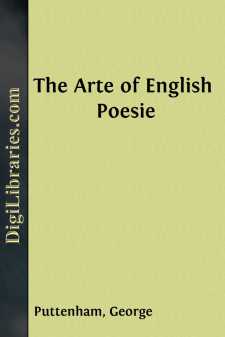Categories
- Antiques & Collectibles 13
- Architecture 36
- Art 48
- Bibles 22
- Biography & Autobiography 813
- Body, Mind & Spirit 142
- Business & Economics 28
- Children's Books 14
- Children's Fiction 11
- Computers 4
- Cooking 94
- Crafts & Hobbies 4
- Drama 346
- Education 46
- Family & Relationships 57
- Fiction 11828
- Games 19
- Gardening 17
- Health & Fitness 34
- History 1377
- House & Home 1
- Humor 147
- Juvenile Fiction 1873
- Juvenile Nonfiction 202
- Language Arts & Disciplines 88
- Law 16
- Literary Collections 686
- Literary Criticism 179
- Mathematics 13
- Medical 41
- Music 40
- Nature 179
- Non-Classifiable 1768
- Performing Arts 7
- Periodicals 1453
- Philosophy 64
- Photography 2
- Poetry 896
- Political Science 203
- Psychology 42
- Reference 154
- Religion 513
- Science 126
- Self-Help 84
- Social Science 81
- Sports & Recreation 34
- Study Aids 3
- Technology & Engineering 59
- Transportation 23
- Travel 463
- True Crime 29
The Arte of English Poesie
by: George Puttenham
Categories:
Description:
Excerpt
CHAP. I.
What a Poet and Poesie is, and who may be worthily sayd the most excellent Poet of our time.
A Poet is as much to say as a maker. And our English name well conformes with the Greeke word: for of [Greek: poiein] to make, they call a maker Poeta. Such as (by way of resemblance and reuerently) we may say of God: who without any trauell to his diuine imagination, made all the world of nought, nor also by any paterne or mould as the Platonicks with their Idees do phantastically suppose. Euen so the very Poet makes and contriues out of his owne braine both the verse and matter of his poeme, and not by any foreine copie or example, as doth the translator, who therefore may well be sayd a versifier, but not a Poet. The premises considered, it giueth to the name and profession no smal dignitie and preheminence aboue all other artificers, Scientificke or Mechanicall. And neuerthelesse without any repugnancie at all, a Poet may in some sort be said a follower or imitator, because he can expresse the true and liuely of euery thing is set before him, and which he taketh in hand to describe: and so in that respect is both a maker and a counterfaitor: and Poesiean art not only of making, but also of imitation. And this science in his perfection, can not grow, but by some diuine instinct, the Platonicks call it furor: or by excellencie of nature and complexion: or by great subtiltie of the spirits & wit or by much experience and obseruation of the world, and course of kinde, or peradventure by all or most part of them. Otherwise how was it possible that Homer being but a poore priuate man, and as some say, in his later age blind, should so exactly set foorth and describe, as if he had bene a most excellent Captaine or Generall, the order and array of battels, the conduct of whole armies, the sieges and assaults of cities and townes? or as some great Princes maiordome and perfect Surueyour in Court, the order, sumptuousnesse and magnificence of royal bankers, feasts, weddings, and enteruewes? or as a Polititian very prudent, and much inured with the priuat and publique affaires, so grauely examine the lawes and ordinances Ciuill, or so profoundly discourse in matters of estate, and formes of all politique regiment? Finally how could he so naturally paint out the speeches, countenance and maners of Princely persons and priuate, to wit, the wrath of Achilles, the magnanimitie of Agamemnon, the prudence of Menelaus, the prowesse of Hector, the maiestie of king Priamus, the grauitie of Nestor, the pollicies and eloquence of Vlysses, the calamities of the distressed Queenes, and valiance of all the Captaines and aduenturous knights in those lamentable warres of Troy? It is therefore of Poets thus to be conceiued, that if they be able to deuise and make all these things of them selues, without any subiect of veritie, that they be (by maner of speech) as creating gods. If they do it by instinct diuine or naturall, then surely much fauoured from aboue. If by their experience, then no doubt very wise men....


